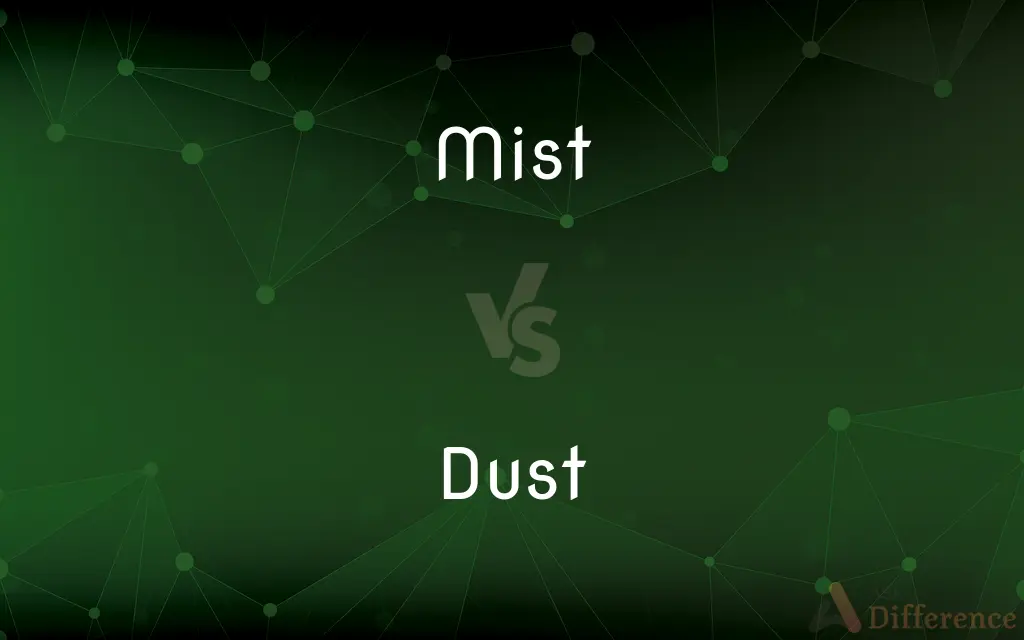Mist vs. Dust — What's the Difference?
By Fiza Rafique & Urooj Arif — Updated on March 31, 2024
Mist is collection of tiny water droplets suspended in air, reducing visibility and creating moist atmosphere. Dust consists of fine particles from sources like soil, pollen, and pollutants, leading to dry conditions and potential respirator irritation.

Difference Between Mist and Dust
Table of Contents
ADVERTISEMENT
Key Differences
Mist forms when water vapor in the air condenses into tiny, visible water droplets, creating a thin, cloud-like layer close to the ground. It's associated with cool, moist conditions and often occurs in natural settings like mountains and forests, or as a result of specific weather patterns. Mist typically reduces visibility but can also impart a refreshing or mystical quality to the environment. Whereas dust comprises small, dry particles that are lifted into the air by natural forces such as wind or human activities such as construction.
While mist is a meteorological phenomenon that enhances humidity and affects light and visibility, providing scenes often described as picturesque or serene, dust is more likely to be associated with arid environments, indoor spaces, and areas of human disturbance. Dust can diminish air quality and visibility but is also a normal part of many ecosystems, playing a role in nutrient cycles.
Mist's presence often signals specific climatic conditions, serving as a natural indicator of humidity levels, precipitation, and temperature changes. On the other hand, the presence and composition of dust can reveal information about local and regional environmental conditions, human activities, and even climate changes over time.
Both mist and dust affect human perception and comfort, though in contrasting ways. Mist can make the air feel cooler and fresher but may impede activities that require clear visibility. Dust, while a nuisance that may dirty surfaces and exacerbate allergies, also reminds us of the constant interaction between the Earth's surface and atmosphere.
The management and impact of mist and dust diverge significantly; while mist might be harnessed for benefits in agriculture or cooling, controlling dust is often a matter of health, safety, and cleanliness, requiring different strategies to minimize its presence and effects in both outdoor and indoor environments.
ADVERTISEMENT
Comparison Chart
Composition
Tiny water droplets suspended in the air.
Fine particles from soil, pollen, fibers, and pollutants.
Environment
Cool, moist conditions; often outdoors in natural settings.
Arid environments, indoors, areas of disturbance.
Visibility & Health
Reduces visibility, generally not harmful to health.
Reduces visibility, can irritate respiratory system.
Impact on Conditions
Increases humidity, affects light and temperature perception.
Contributes to dry conditions, affects air quality.
Role & Perception
Creates picturesque scenes, indicative of weather changes.
Indicates environmental and human activity, often seen as a nuisance.
Compare with Definitions
Mist
A phenomenon of tiny water droplets suspended in the air, creating a light, moist haze.
The morning mist over the lake created a serene landscape.
Dust
Fine particles of matter, often airborne, from various natural and human-made sources.
After the sandstorm, a fine layer of dust covered everything.
Mist
Moisture condensed from the air, settling close to the ground.
A gentle mist enveloped the forest at dawn.
Dust
Dry particles that accumulate on surfaces and in the air, affecting cleanliness and air quality.
The abandoned room was thick with dust, undisturbed for years.
Mist
A natural occurrence that reduces visibility and cools the air.
The mist made the early walk through the park refreshingly cool.
Dust
Can contribute to health issues when inhaled over time.
The workers wore masks to protect against dust inhalation.
Mist
Often associated with certain weather patterns and climates.
The coastal city was known for its frequent, misty mornings.
Dust
Plays a role in nutrient cycles and soil formation in nature.
Wind-blown dust from distant deserts can fertilize rainforests thousands of miles away.
Mist
Symbolic of mystery or the ephemeral in literature and art.
The castle was barely visible, shrouded in mist, like something out of a fairy tale.
Dust
A substance associated with arid environments and human activity.
The construction site was a major source of dust in the neighborhood.
Mist
Mist is a phenomenon caused by small droplets of water suspended in air. Physically, it is an example of a dispersion.
Dust
Dust is made of fine particles of solid matter. On Earth, it generally consists of particles in the atmosphere that come from various sources such as soil lifted by wind (an aeolian process), volcanic eruptions, and pollution.
Mist
A cloud of tiny water droplets suspended in the atmosphere at or near the earth's surface that limits visibility (to a lesser extent than fog; strictly, with visibility remaining above 1 km)
The peaks were shrouded in mist
A mist rose out of the river
Dust
Fine, dry particles of matter.
Mist
Cover or become covered with mist
The windows of the car were misted up with condensation
The glass was beginning to mist up
Dust
A cloud of fine, dry particles.
Mist
A mass of fine droplets of water in the atmosphere near or in contact with the earth.
Dust
Particles of matter regarded as the result of disintegration
Fabric that had fallen to dust over the centuries.
Mist
Water vapor condensed on and clouding the appearance of a surface.
Dust
Earth, especially when regarded as the substance of the grave
"ashes to ashes, dust to dust" (Book of Common Prayer).
Mist
Fine drops of a liquid, such as water, perfume, or medication, sprayed into the air.
Dust
The surface of the ground.
Mist
A suspension of fine drops of a liquid in a gas.
Dust
A debased or despised condition.
Mist
Something that dims or conceals.
Dust
Something of no worth.
Mist
A haze before the eyes that blurs the vision.
Dust
Chiefly British Rubbish readied for disposal.
Mist
Something that produces or gives the impression of dimness or obscurity
The mists of the past.
Dust
Confusion; agitation; commotion
Won't go back in until the dust settles.
Mist
A drink consisting of a liquor served over cracked ice.
Dust
To remove dust from by wiping, brushing, or beating
Dust the furniture.
Mist
To be or become obscured or blurred by or as if by mist.
Dust
To sprinkle with a powdery substance
Dusted the cookies with sugar.
Dust crops with fertilizer.
Mist
To rain in a fine shower.
Dust
To apply or strew in fine particles
Dusted talcum powder on my feet.
Mist
To conceal or veil with or as if with mist.
Dust
(Baseball) To deliver a pitch so close to (the batter) as to make the batter back away.
Mist
To moisturize (plants or dry air, for example) with a fine spray of water.
Dust
To clean by removing dust.
Mist
Water or other liquid finely suspended in air. fog, haze.}}
It was difficult to see through the morning mist.
Dust
To cover itself with dry soil or other particulate matter. Used of a bird.
Mist
(countable) A layer of fine droplets or particles.
There was an oily mist on the lens.
Dust
Fine particles
Mist
(figurative) Anything that dims, darkens, or hinders vision.
Dust
(uncountable) Fine, dry particles of matter found in the air and covering the surface of objects, typically consisting of soil lifted up by the wind, pollen, hair, etc.
Mist
To form mist.
It's misting this morning.
Dust
Submicron particles in outer space, largely silicates and carbon compounds, that contribute greatly to extinction at visible wavelengths.
Mist
To spray fine droplets on, particularly of water.
I mist my tropical plants every morning.
Dust
(obsolete) A single particle of earth or other material.
Mist
To cover with a mist.
The lens was misted.
Dust
(countable) The act of cleaning by dusting.
Mist
(of the eyes) To be covered by tears.
My eyes misted when I remembered what had happened.
Dust
The earth, as the resting place of the dead.
Mist
To disperse into a mist, accompanying operation of equipment at high speeds.
Dust
The earthy remains of bodies once alive; the remains of the human body.
Mist
Visible watery vapor suspended in the atmosphere, at or near the surface of the earth; fog.
Dust
(figurative) Something worthless.
Mist
Coarse, watery vapor, floating or falling in visible particles, approaching the form of rain; as, Scotch mist.
Dust
(figurative) A low or mean condition.
Mist
Hence, anything which dims or darkens, and obscures or intercepts vision.
His passion cast a mist before his sense.
Dust
Cash; money (in reference to gold dust).
Mist
To cloud; to cover with mist; to dim.
Dust
(colloquial) A disturbance or uproar.
To raise, or kick up, a dust
Mist
To rain in very fine drops; as, it mists.
Dust
(mathematics) A totally disconnected set of points with a fractal structure.
Mist
A thin fog with condensation near the ground
Dust
(transitive) To remove dust from.
The cleaning lady needs a stool to dust the cupboard.
Mist
Become covered with mist;
The windshield misted over
Dust
(intransitive) To remove dust; to clean by removing dust.
Dusting always makes me cough.
Mist
Make less visible or unclear;
The stars are obscured by the clouds
Dust
(intransitive) Of a bird, to cover itself in sand or dry, dusty earth.
Mist
Spray finely or cover with mist
Dust
(transitive) To spray or cover something with fine powder or liquid.
The mother dusted her baby's bum with talcum powder.
Dust
To leave; to rush off.
Dust
To reduce to a fine powder; to levigate.
Dust
(slang) To kill.
Dust
Fine, dry particles of earth or other matter, so comminuted that they may be raised and wafted by the wind; that which is crumbled to minute portions; fine powder; as, clouds of dust; bone dust.
Dust thou art, and unto dust shalt thou return.
Stop! - for thy tread is on an empire's dust.
Dust
A single particle of earth or other matter.
Dust
The earth, as the resting place of the dead.
For now shall sleep in the dust.
Dust
The earthy remains of bodies once alive; the remains of the human body.
And you may carve a shrine about my dust.
Dust
Figuratively, a worthless thing.
And by the merit of vile gold, dross, dust.
Dust
Figuratively, a low or mean condition.
[God] raiseth up the poor out of the dust.
Dust
Gold dust
Dust
To free from dust; to brush, wipe, or sweep away dust from; as, to dust a table or a floor.
Dust
To sprinkle with dust.
Dust
To reduce to a fine powder; to levigate.
Dust
Fine powdery material such as dry earth or pollen that can be blown about in the air;
The furniture was covered with dust
Dust
The remains of something that has been destroyed or broken up
Dust
Free microscopic particles of solid material;
Astronomers say that the empty space between planets actually contains measurable amounts of dust
Dust
Remove the dust from;
Dust the cabinets
Dust
Rub the dust over a surface so as to blur the outlines of a shape;
The artist dusted the charcoal drawing down to a faint image
Dust
Cover with a light dusting of a substance;
Dust the bread with flour
Dust
Distribute loosely;
He scattered gun powder under the wagon
Common Curiosities
How does dust affect health?
Dust can affect health by irritating the respiratory system, triggering allergies, and in some cases, leading to more serious conditions with prolonged exposure.
What measures can be taken to control dust?
Measures to control dust include using air purifiers, maintaining clean indoor environments, planting vegetation to stabilize soil, and implementing dust suppression techniques at construction sites.
Can mist occur indoors?
Yes, mist can occur indoors in controlled environments like greenhouses or during activities that generate fine water spray, though it's more common outdoors.
How do mist and dust affect visibility?
Both mist and dust reduce visibility; mist does so by scattering light through water droplets, while dust does so by the presence of fine particles in the air.
How can mist be beneficial?
Mist can be beneficial by providing moisture to plants in dry environments, reducing temperatures, and contributing to atmospheric water cycles.
What is mist made of?
Mist is made of tiny water droplets that are suspended in the air, resulting from the condensation of water vapor.
How are mist and dust studied scientifically?
Scientists study mist and dust using meteorological instruments, air quality monitors, satellite imagery, and other tools to understand their composition, sources, and impacts on health and environment.
What are common sources of dust?
Common sources of dust include soil, pollen, human and animal dander, construction activities, and industrial emissions.
Does mist have any environmental significance?
Yes, mist can significantly impact local climates, ecosystems, and water cycles, especially in regions where it's a primary source of moisture.
Is dust always considered harmful?
While not always harmful, dust can be a nuisance and a health hazard, particularly in large quantities or with certain compositions like silica or asbestos.
Share Your Discovery

Previous Comparison
Unauthorised vs. Unauthorized
Next Comparison
Knickers vs. PantsAuthor Spotlight
Written by
Fiza RafiqueFiza Rafique is a skilled content writer at AskDifference.com, where she meticulously refines and enhances written pieces. Drawing from her vast editorial expertise, Fiza ensures clarity, accuracy, and precision in every article. Passionate about language, she continually seeks to elevate the quality of content for readers worldwide.
Co-written by
Urooj ArifUrooj is a skilled content writer at Ask Difference, known for her exceptional ability to simplify complex topics into engaging and informative content. With a passion for research and a flair for clear, concise writing, she consistently delivers articles that resonate with our diverse audience.















































